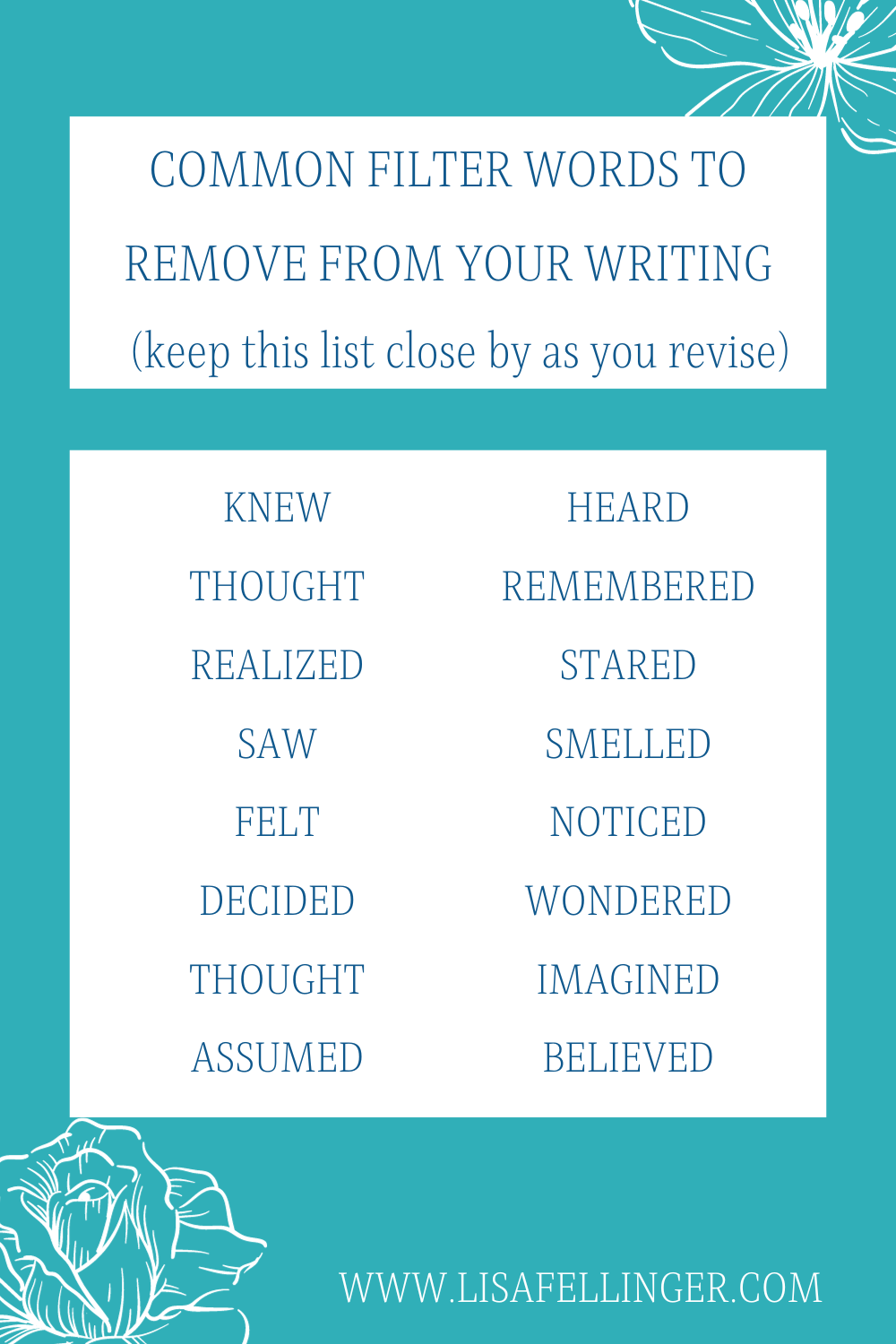Why Filter Words Hurt Your Writing
(And How to Fix Them)
Overusing filter words is one of the most common issues I find when completing developmental edits. The good news is, once you know how to recognize filter words in your own writing, they’re generally a pretty simple fix. But if you don’t know what filter words are or how to identify them in your writing, they can have a rather big negative effect on your manuscript.
What Are Filter Words?
Before we can work on fixing filter words, we need to know what they are. Filter words are words that filter the story experience through the lens of a character. They tend to make a story feel very “told” rather than “shown” as they often serve to tell the reader what the character is feeling or observing rather than allowing the reader to fully connect with the story and experience it for themselves.
Examples of common filter words include saw, felt, realized, thought, heard, knew, or decided. This isn’t an exhaustive list by any means, but these are the most common ones I see in manuscripts.
Why Do Filter Words Hurt Your Writing?
Readers want a story they can immerse themselves in. They want to feel like they’re experiencing the story for themselves rather than being told what someone else’s experience of the story events is or feeling like they’re being told how to feel or think about the story events. Filter words, by nature, work directly against that mission.
While a filter word here or there likely won’t pull a reader out of the story, peppering your story with too many filter words will give the story an overall told feeling, and whether readers know why or not, they’ll feel disconnected from the story.
Filter words are used often in early drafts because they’re easier for the writer. It’s so much easier to write “I felt sad” than to actually describe the sadness for that character. And often, this is perfect for a first draft. When going through a first draft, we’re telling ourselves the story rather than writing it for readers. We’re still getting to know the characters and what’s going to happen, so taking a shortcut like this can help us get down a general idea and move onto the next rather than getting stuck taking the time to fully show something. But as we move into revision, these are the kinds of things we need to take note of and spend some time fully dramatizing so our readers have the experience they’re looking for when they read our story.
How to Find & Fix Filter Words
Luckily, once you know what filter words are, they’re pretty easy to spot and fix in your own writing. And taking the time to fix filter words can have a huge impact on your manuscript.
First, keep this list of common filter words handy as you work through revisions. These are the most common filter words, but of course, there are others. As you go through your manuscript, keep an eye out for these words (I often highlight these as I do a read through of my manuscript). Then, when you work through revisions, consider each instance and how you might better show the sentence without the filter word.
Often, this can be as simple as just removing the filter word. For example, for the sentence “She saw a boy jump across the pond,” you could just remove the filter word, leaving you with “A boy jumped across the pond.” In the revised sentence, the reader still sees the boy jump across the pond, but it’s no longer filtered through the character’s point of view. This allows readers to connect with the sentence, and the overall story, better. They feel as though they’re the one witnessing the boy jump across the pond rather than being told that someone else saw the boy jump across the pond. A small difference, but one that makes a large impact, especially when done repeatedly throughout a manuscript.
Other times, editing a filter word out of a sentence may require you to dig deeper into the scene to really describe what’s going on. For example, the sentence “He felt angry” isn’t as simple as removing the filter word. Even reworking that sentence will likely result in some kind of filter word or telling us that the character is angry. Instead, how might you show the reader his anger? What is he doing, experiencing, and/or saying that will show that anger in a descriptive way?
In these instances, I often recommend the amazing resource The Emotion Thesaurus by Becca Puglisi and Angela Ackerman for writers to jumpstart some ideas of how they can show the emotion rather than tell their readers. The book is set up like a thesaurus with an entry for each emotion and then examples of internal and external reactions a person might experience for each emotion. This can often give a writer an idea of how better to show the emotion or serve as a starting point for finding the right reactions. This is dynamite resource, and one I often recommend to my clients. I have a copy on iBooks so no matter where I’m writing, I can easily pull this up if I need to reference it for ideas.
Hopefully this helps you understand not only what filter words are and why they hurt your writing but also how you can find them in your own manuscript and edit them out. While this is absolutely something your developmental editor can help you with, the more you’re able to revise these on your own before sending your manuscript, the more time and energy your editor will be able to spend on other, more complicated, issues, and the more value you’ll gain from your edit.
One final tip: filter words often come down to writers either not trusting themselves to make a point clear or not trusting their reader to connect the dots and come to the conclusion the writer wants them to. Trust your ability to paint the picture for your reader. And then trust your reader to understand what you’re showing them. When readers feel like they’re being told how to process a story, they often disconnect. So, breathe and put trust in yourself. You’re a strong enough writer to dramatize these things for your reader in a way that they’ll understand exactly what you’re saying without directly telling them.


